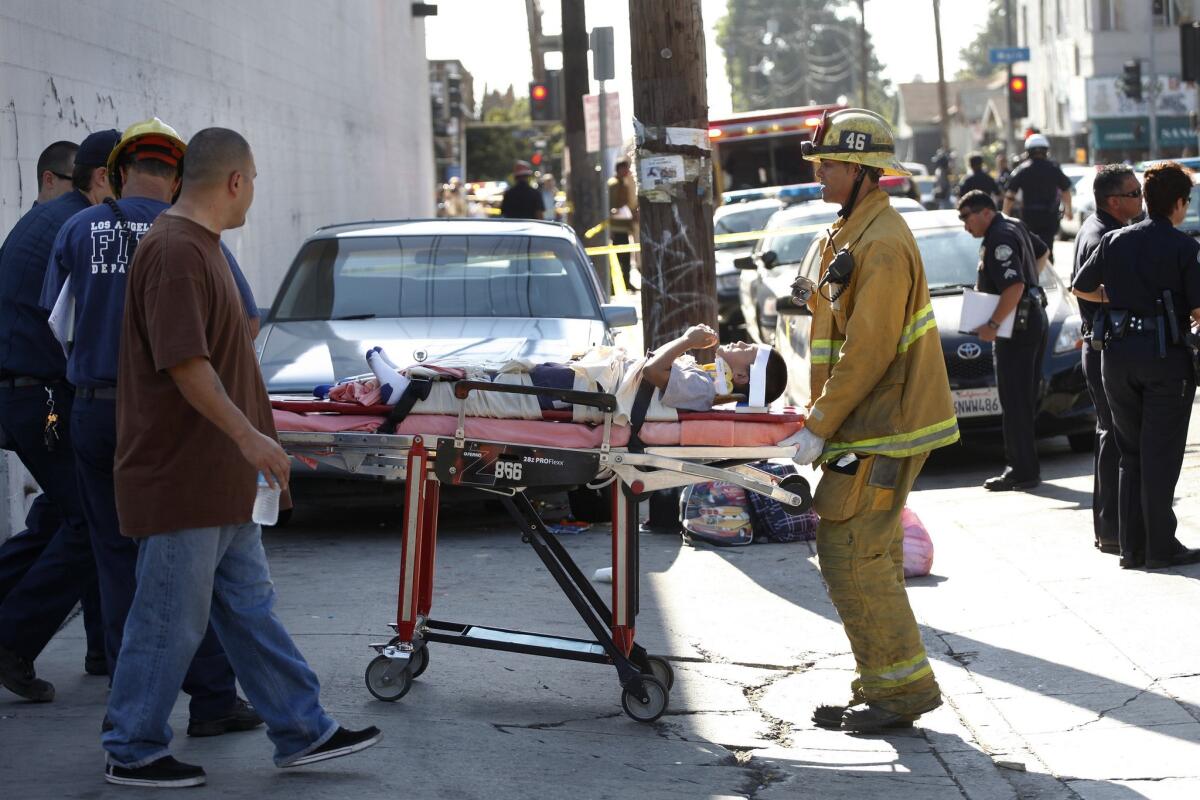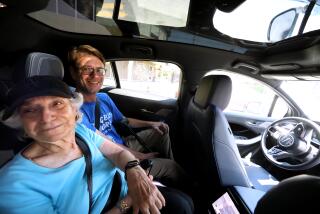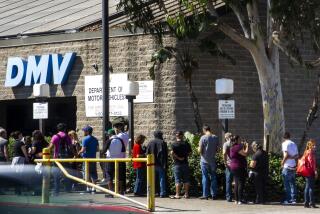Opinion: Should elderly drivers face different licensing rules?

A young boy is transported to an ambulance after a car driven by an elderly driver ran into a group of children and adults near a South Los Angeles school in 2012. The incident was among several that have fanned discussions about older drivers and public safety.
It was without a doubt a tragedy. Last October, 92-year-old Mary Catherine O’Neil put her car into reverse and, allegedly without looking, backed up and killed Melissa Bonney Ratcliff, 45, in a San Diego parking lot. This week the San Diego city attorney charged O’Neil with vehicular manslaughter in a bid, in part, to force O’Neil to give up her driver’s license.
Without getting into O’Neil’s guilt or innocence, the incident is one of several in recent years (and over an even longer span) involving elderly drivers that have raised debates about whether different driving license rules should kick in as we age.
The Times editorial page weighed in on this issue nearly three years ago after a 100-year-old driver backed his car into a crowd of children and adults near Main Street Elementary School in South Los Angeles, injuring 11 people.
It is a dicey issue, because aging affects reaction times and mental awareness in people at different rates. Some nonagenarians are fine driving; some folks in their 70s shouldn’t have the keys. So a blanket policy barring those over, say, 90 from driving isn’t workable. Nor is it fair, because it is inherently discriminatory to deny a privilege to an adult simply based on age.
The board at the time argued that it did make sense, though, to increase scrutiny of drivers as they age to ensure that their rights, and public safety, are protected. This is the editorial:
Safety and older drivers
Aug. 31, 2012
We don’t know definitively that age was a factor in the accident that occurred when a 100-year-old driver — 101 next week — backed his car into a South Los Angeles street, hitting 11 children and adults and seriously injuring four of them. Maybe the brakes on Preston Carter’s 22-year-old Cadillac failed, as he told reporters at the scene. Or maybe he made the kind of mistake that any driver of any age might make. Police detectives are still investigating.
But once again, a highly publicized accident involving an elderly driver on local streets raises the issue of how closely aging drivers’ skills should be monitored. Currently, California requires no further road testing of drivers after they acquire their licenses, although any driver may be called in for a reexamination if law enforcement officials ask for it or if the Department of Motor Vehicles gets a formal request (from anyone) urging that he or she be tested. California drivers who are 70 or older — and there are more than 2 million of them — must pass vision and written tests every five years. Those rules, which can be changed only by an act of the Legislature or a ballot measure, should be made more stringent.![]()
In general, older drivers are more prudent and take fewer risks than younger ones, and only a low percentage of them are involved in accidents. Carter’s driving record was spotless, according to the DMV. But it is also undeniable that as people age, they become more vulnerable to decreases in reaction time, cognition, vision and alertness.
There will only be more senior drivers as the baby boomers age. The Automobile Assn. of America estimates that by 2030, there will be more than 70 million people age 65 and older in the country, and as many as 90% will possess driver’s licenses. The agency even suggests that people think about planning a driving “retirement” as they outlive their ability to handle a car.
Driving is a key to independence and self-reliance — qualities that the elderly prize and that keep them vibrant. But driving is also a regulated privilege. The state should require an additional road test of elderly drivers at a certain age — 75 was proposed in the Legislature some years ago and seemed reasonable — and renewal periods should be gradually shortened as the driver gets older. In the meantime, the many agencies that deal with auto safety, including the California DMV, the AAA and the National Highway Traffic Safety Administration, have volumes of information on their websites about how older drivers can remain safe and when to hang up the keys.
Follow Scott Martelle on Twitter @smartelle.
More to Read
A cure for the common opinion
Get thought-provoking perspectives with our weekly newsletter.
You may occasionally receive promotional content from the Los Angeles Times.











